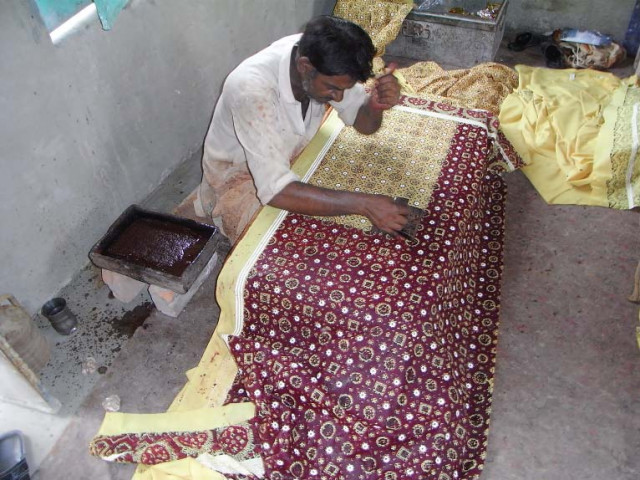A moribund craft: One man’s crusade to keep Ajraks on the shelves
With demand plummeting the number of printing units have gone down from a heady 150 to just one — his unit — today.

Mohammad Arib Mirbahar has been making Ajraks for as long as he can remember. He claims to have been in the Ajrak-printing business for the last 45 years. A symbol of Sindhi culture and identity, the Ajrak is ubiquitous across the province, and the most common gift or offering. However, over the last several years, Mirbahar has seen demand plummet — to the point where it is no longer a viable business. He has seen the number of printing units go down from a heady 150 to just one — his unit — today.
“I am uneducated and so are my sons. We don’t even know any other work. Therefore, we cannot quit this work,” Mirbahar told The Express Tribune. “Also, mine is the last Ajrak printing unit left in Sukkur out of the 150 or so units that once operated in the city. That is another reason why I don’t want to quit as it’s part of my culture and I want to keep it alive,” he added poignantly.
The process
A piece of a raw cloth has to pass through eight phases to turn into a traditional Ajrak. First, the cloth, which is purchased from Faisalabad, is soaked in yellow colour to make it durable and strong.
Then the printing process starts. First light pink colour is applied, followed by white pattern, after that comes red and finally indigo.
Once the printing process is completed, the printed Ajraks are taken to the river and washed thoroughly. It is then spread out to dry.
All Ajraks are made by the same process. However, certain Ajraks come out shiny after drying while others emerge dull. The prices are different for the two. A shiny Ajrak is more expensive.
Commercial viability
Mirabahar disclosed that over 15,000 people were working for the Ajrak printing industry at the time when there were 150 units. “An Ajrak printer can not earn more than Rs200 per day, which is quite insufficient.” With inflation and low wages, units kept closing one after the other, he said.
He sells the Ajraks to wholesalers in the city for Rs150 per piece, while shopkeepers sell them from Rs200 to Rs400 depending upon the shine.
The shopkeepers sometimes claim that the Ajrak is printed in Hala in order to get a higher price. He said that herbal colours are used for printing in Hala, while here in Sukkur, he uses the more durable chemical colours.
Moreover, as his printing unit is established within a portion of his house, he says he is often visited by officials from the Sukkur Electric Power Company (Sepco) and the tax department. But Mirbahar says they don’t bother him. “When Sepco officials ask me to pay electricity dues under the commercial slab, I just point out that my business doesn’t run on electricity. Similarly, I ask tax department officials to sit at my house daily and see for themselves how much I make.”
Internal grumblings
Mirbahar’s eight sons and three grandsons are also part of his business. But most of them are not happy with the work.
Riaz, his eldest son, while dissatisfied, is stoical in his outlook. Being illiterate and lacking any other craft, he knows that he has no other choice. “Twelve members of my family toil from early morning to late in the evening and we are barely able to make ends meet. But we must thank God that we can at least earn our livelihood in a dignified manner,” says Riaz as he prints an Ajrak. “Our father was not able to send us to school and get us an education, and similarly, we cannot afford it for our children,” he bemoaned.
Another one of Mirbahar’s sons, Mohammad Ali is more vocal about his unhappiness. “This is not the life one dreams of. I often argue with my father, and sometimes I get so frustrated that I want to leave everything behind and flee.” But Ali, too, knows that he doesn’t have many alternatives due to his lack of education. “Who will hire an illiterate person like me? Therefore, it’s better to live and die here,” he concluded ruefully.
The future…
The elderly Mirbahar laughed at his son while they grumbled. “After my death they might switch over to some other business but what will they do? They are neither literate nor do they know anything other than Ajrak printing,” he asks with a glint in his eyes. “As long as I am alive, I won’t quit this work because I love the Ajrak being part of my culture.”
Published in The Express Tribune, May 24th, 2011.


















COMMENTS
Comments are moderated and generally will be posted if they are on-topic and not abusive.
For more information, please see our Comments FAQ